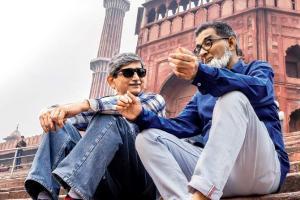There cannot be a better time for the authors of a new book to examine the problems plaguing Islamic seminaries in the country, and why well-heeled Muslims avoid sending their kids there.

Professor Dr M Aslam Parvaiz and senior journalist Ziya Us Salam catch up for a chat at the Jama Masjid in Delhi. Pic/ Nishad Alam
Dr M Aslam Parvaiz likes to call himself a man of science. "It's not just a subject for me, but an ideology," says the botany professor and vice-chancellor of Hyderabad's Maulana Azad National Urdu University. It was with this scientific temperament that Parvaiz first engaged with the Quran, years ago. "The most fundamental thing that struck me was that while the Quran urged every reader to observe and explore nature and use it for the service of humanity, in Islam, we had somehow vertically divided education into the worldly and religious," he explains, over a telephonic interview. This went against the spirit of the faith.
A living example of this, says Parvaiz, is the madrasa, the Islamic seminary meant to encourage learning of all kinds. Once centres of intellectual and scientific talent that nurtured scientist Jabir ibn Hayyan (721-815) and doctor Abu Ali Sina (980-1037), madrasas of today—especially in India—are "much removed from the
21st century".
ADVERTISEMENT
Madrasas in the Age of Islamophobia (SAGE), that Parvaiz has co-authored with Delhi-based senior journalist Ziya Us Salam, examines the need to de-stigmatise them as a breeding place for terrorism.
The madrasas, the authors say, are symptomatic of what's wrong with the world of believers. "A community which made landmark contributions to science has become tied down to blind imitation and hidebound traditionalism," they write in the book.
Salam's own interest in madrasas began during visits to the mosque across his office in Bahadur Shah Zafar Marg, New Delhi, for the afternoon prayers. "There were about 50 kids at the madrasa [attached to the mosque], and they could be heard reciting the Quran all through the day, memorising it by rote. Not once did I find their teacher explaining the meaning of the verses that they were reading," he recalls. "Even when they graduate to other madrasas to pursue higher learning, they are asked to read commentaries from 14th century texts of Ibn Khatir, and not by a contemporary scholar. It seems as if there is no scholar from the 20th century who is worthy of being read by the next generation. Islamic preachers here believe that Islam doesn't have scholars of repute after the 14th century, which is rubbish. They are caught in a time warp," says Salam.
 The Darul Uloom, Deoband in 1950. The seminary was set up not only to provide quality religious education, but also as counter to Lord Macaulay’s education system. Pic courtesy/ Madrasa in the age of Islamophobia, Sage
The Darul Uloom, Deoband in 1950. The seminary was set up not only to provide quality religious education, but also as counter to Lord Macaulay’s education system. Pic courtesy/ Madrasa in the age of Islamophobia, Sage
Parvaiz, he says, was the right person to join hands with for the research, because of the work he has done over 25 years. Back in the 1990s, the professor, in his attempt to promote critical thinking among students, started a homegrown science magazine in Urdu, and sent complementary copies to madrasas across the country. The magazine is now in its 26th year of uninterrupted publication.
Their research has taken them to madrasas of all kinds—those that are currently in shambles, and even model examples, like the ones in Kerala and Bengal, which continue to serve the initial purpose of providing education. But overall, the institution, says Salam, cuts a sorry figure. This is exactly why the "well off, well-read and well-placed Muslims" don't send their children to madrasas. According to Salam, only four per cent of the current Muslim population in India, has studied in a madrasa at some point.
Both Parvaiz and Salam feel that government intervention is crucial to resolve the problem of inadequate learning. "If a large chunk of the community is not mainstream, they became a burden on society. Typically, a madrasa graduate cannot do much beyond starting a new madrasa or read prayers in a mosque, or become a muezzin." They believe that if resources, in the form of teachers and books, are made available, madrasas could become mainstream.
The Islamophobic wave that has led to the branding of students from madrasas as terrorists—a claim which the authors say is untrue—has only alienated this institution further. "The branding is political. Sometimes for your own survival, you have to invent an enemy. This is what Pakistan is doing. This is what the US did," says Parvaiz. But the bigger problem lies within the community. "Over the years, I have noticed that we [Muslims] have retreated into a shell and are getting disconnected. We need to interact with other cultures in the societies we are living in. The only counter-narrative for otherness is to resolve it. You cannot change political ideologies used to harness votes, but you can weaken them."
Catch up on all the latest Mumbai news, crime news, current affairs, and also a complete guide on Mumbai from food to things to do and events across the city here. Also download the new mid-day Android and iOS apps to get latest updates
 Subscribe today by clicking the link and stay updated with the latest news!" Click here!
Subscribe today by clicking the link and stay updated with the latest news!" Click here!







